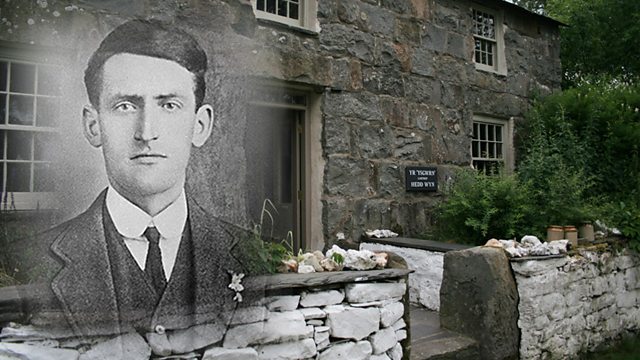
Yr Ysgwrn, Trawsfynydd: Hedd Wyn
In September, the chair was awarded to him, and was brought home by horse and cart. It now stands in the parlour of Ellis’s family home, Yr Ysgwrn, near Trawsfynydd.
The chairing of the bard is normally the highlight of any eisteddfod, when the winner of the most prestigious competition, in the most challenging genre of poetry, is finally revealed, and he or she can walk up to the stage in triumph to claim their prize. But at the Birkenhead National Eisteddfod in 1917 things were a little different. The bard was dead. And instead of celebration, there was mourning, as the chair was draped in black cloth.
The Black Chair has given Wales a memorable image of the tragedy of war. But what of the young man who should have sat in it?
Unlike some of his literary contemporaries, Hedd Wyn (Ellis Humphrey Evans 1887-1917) enjoyed very few advantages in life, and no formal education after the age of 12, when he was required to work on the family farm. His passion, however, was for the natural world and poetry. Largely self-taught, he immersed himself in the Welsh eisteddfodic tradition, and also read widely in English, in particular the poetry of Shelley. Writing within the conventions of the time, Hedd Wyn managed to fashion verse of quite striking power – verse which was later gathered posthumously under the title of Cerddi’r Bugail or ‘songs of the shepherd’.
Competing in various local eisteddfodau he soon enjoyed success, winning various chairs. In 1916 he was called up to serve in the army, and was sent to Litherland army camp, near Liverpool. He was released to help on the family farm in March 1917 , and it was during his seven weeks of furlough that he first drafted his winning awdl (ode) on the subject of ‘yr Arwr’ or the Hero. According to his nephew, Gerald Williams, he wrote that ode on the kitchen table.
On 31st July 1917 Private Evans was killed during the battle for Pilckem Ridge, near Ypres. Fortunately for posterity, he found time to post his winning entry to the eisteddfod adjudicators. In September, the chair was awarded to him, and was brought home by horse and cart. It now stands in the parlour of Ellis’s family home, Yr Ysgwrn, near Trawsfynydd. And that home, lovingly preserved by Hedd Wyn’s nephew, Gerald Williams, serves as a fitting memorial to a fine poet – a poet who wrote in wartime, rather than a poet who wrote exclusively about war.
Some of Hedd Wyn’s poems have entered the canon of Welsh literature, and are celebrated for their moving testimony to the impact of war on a sensitive farmer’s boy from Trawsfynydd. But Yr Ysgwrn may be enjoyed even by those with no knowledge of Welsh as an authentic record of rural life in 1917, barely altered from the day Ellis left for war.
Location: Yr Ysgwrn, Trawsfynydd, Blaenau Ffestiniog, Gwynedd, LL41
Image of Hedd Wyn courtesy of Awdurdod Parc Cenedlaethol Eryri / Snowdonia National Park Authority
Duration:
This clip is from
Featured in...
![]()
Arts & Media
The impact on arts, literature, poetry and journalism
![]()
����ý Radio Wales—World War One At Home
Places in Wales that tell a story of World War One
More clips from World War One At Home
-
![]()
The loss of HMY Iolaire
Duration: 18:52
-
![]()
Scotland, Slamannan and the Argylls
Duration: 07:55
-
![]()
Scotland Museum of Edinburgh mourning dress
Duration: 06:17
-
![]()
Scotland Montrose 'GI Brides'
Duration: 06:41







